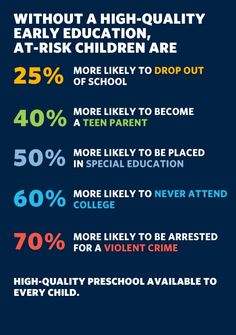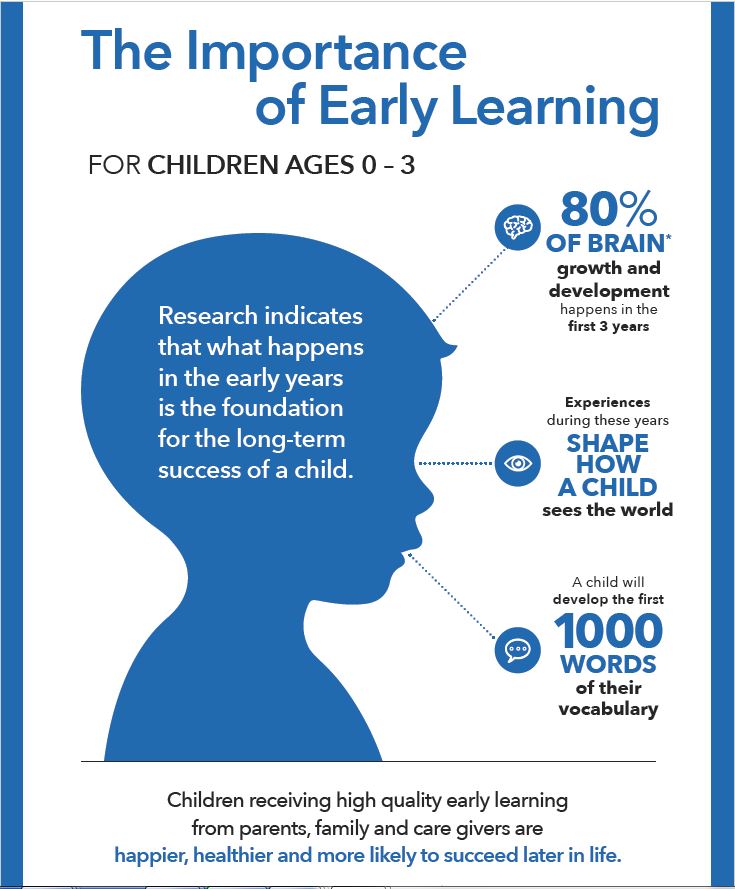Why Early Childhood Education is Important: Building a Strong Foundation.

Early childhood education is crucial for a child’s cognitive, social, and emotional development. It lays the foundation for lifelong learning and success.
Investing in early childhood education sets the stage for a child’s future academic achievement and overall well-being. It helps children develop essential skills, such as language, problem-solving, and social interaction, which are vital for their future success. Additionally, early childhood education has been linked to higher graduation rates, lower crime rates, and increased earning potential in adulthood.
By providing a stimulating and nurturing environment, early childhood education nurtures a love for learning and sets children on a path towards a bright and promising future. This critical phase of education empowers children to reach their full potential and become productive members of society.

Credit: yaffe.com
The Importance Of Early Childhood Education
Early childhood education plays a crucial role in laying the foundation for a child’s overall development. It encompasses a range of experiences and activities that shape a child’s cognitive, social, and emotional growth. Understanding the importance of early childhood education is essential for parents, educators, and policymakers to provide the best opportunities for young children.
Cognitive Development
Early childhood education fosters cognitive development by stimulating a child’s curiosity and imagination. Through engaging activities and interactive learning, children develop essential thinking skills such as problem-solving, decision-making, and critical thinking.
Social And Emotional Development
Early childhood education also plays a vital role in nurturing social and emotional development. It provides a supportive environment for children to learn empathy, cooperation, and communication skills. Moreover, it helps in building self-confidence and emotional resilience in young learners.
Benefits Of Investing In Early Childhood Education
Investing in early childhood education yields lifelong benefits, shaping a strong foundation for future academic and social success. It fosters cognitive development, emotional intelligence, and social skills, providing children with a head start for their future endeavors. Early education also contributes to reduced societal costs and better economic outcomes in the long run.
Benefits of Investing in Early Childhood Education Early childhood education plays a crucial role in shaping a child’s future. Investing in early childhood education yields numerous long-term benefits, impacting academic success and future earning potential. Let’s delve into the specific advantages of prioritizing early childhood education. Long-Term Academic Success Early childhood education sets a strong foundation for academic achievement. Children exposed to quality education in their formative years develop essential cognitive, social, and emotional skills. These skills, such as critical thinking, creativity, and problem-solving, lay the groundwork for lifelong learning and academic excellence. Higher Earning Potential Investing in early childhood education correlates with higher earning potential in adulthood. Children who receive quality early education are more likely to attain higher levels of education and secure well-paying jobs. This early investment ultimately translates into increased financial stability and economic independence later in life. By prioritizing early childhood education, society can nurture a generation of individuals equipped with the skills and knowledge necessary to thrive in an ever-evolving world. The long-term benefits of such investment extend beyond the individual, positively impacting communities and the broader economy.Challenges In Early Childhood Education
Early childhood education plays a crucial role in laying the foundation for a child’s future success. However, several challenges exist that hinder the accessibility and quality of education for young children. Addressing these challenges is essential to ensure that every child has the opportunity to receive a high-quality early childhood education.
Access And Affordability
Access to early childhood education remains a significant challenge, particularly for families in low-income communities. Many families struggle to find affordable and accessible early education programs for their children. The lack of options often forces parents to choose subpar or inadequate care for their children, impacting their development in the long run.
Quality Of Education
The quality of early childhood education varies widely, with many programs lacking the necessary resources and trained educators. This disparity in quality can have a lasting impact on a child’s cognitive and social development. Ensuring that all early childhood education programs meet high-quality standards is essential to provide every child with a solid educational foundation.
Effective Teaching Strategies In Early Childhood Education
Effective teaching strategies in early childhood education are crucial for laying a strong foundation for a child’s future learning and development. It is during these formative years that children absorb information at an incredible rate, making it essential for educators to employ the most impactful methods to facilitate learning.
Play-based Learning
Play-based learning is a cornerstone of early childhood education. Through play, children engage in hands-on activities that promote cognitive, social, and emotional development. By incorporating elements of fun and exploration, educators can create an environment where children naturally absorb knowledge and skills without feeling pressured or overwhelmed.
Individualized Instruction
Individualized instruction acknowledges that each child has unique learning styles, strengths, and challenges. Tailoring teaching methods to suit individual needs allows educators to effectively address each child’s specific requirements, ensuring that they receive the support and guidance necessary for their optimal development.
The Role Of Parents In Early Childhood Education
The Role of Parents in Early Childhood Education
Parental Involvement
Parents play a crucial role in shaping their child’s early education.
Creating A Supportive Home Environment
Setting up a nurturing home environment can greatly impact a child’s learning.

Credit: www.linkedin.com
Innovations In Early Childhood Education
Early Childhood Education is crucial for a child’s development, laying the foundation for future learning and success. Innovations in this field, such as interactive learning tools and play-based activities, are enhancing the learning experience, fostering creativity, and promoting holistic growth in young children.
Early childhood education has undergone significant changes over the years, with the introduction of innovative approaches that have revolutionized how children learn and develop. Innovations such as technology integration and inclusive education practices have transformed the way educators teach and interact with young children. These new approaches have helped to create a more engaging and interactive learning environment that supports children’s cognitive, social, and emotional development.Technology Integration
Incorporating technology into early childhood education has become more prevalent in recent years. This innovation has enabled educators to create more engaging and interactive learning experiences for children. For instance, the use of interactive whiteboards, tablets, and educational apps has allowed children to learn through play, making learning more fun and enjoyable. Moreover, technology integration has helped to develop children’s digital literacy skills, a crucial aspect of their future success.Inclusive Education Practices
Inclusive education practices have become another significant innovation in early childhood education. This approach emphasizes the importance of creating an environment where all children feel valued, respected, and included. Inclusive education practices ensure that children with diverse backgrounds, abilities, and learning styles can learn and grow together. This approach helps to promote empathy, understanding, and acceptance, which are essential qualities that children need to thrive in a diverse and interconnected world. In conclusion, innovations in early childhood education have brought about significant changes that have revolutionized how children learn and develop. Technology integration and inclusive education practices have created a more engaging and interactive learning environment that supports children’s cognitive, social, and emotional development. These innovations have helped to create a learning environment that prepares children for the future by developing their digital literacy skills and promoting empathy, understanding, and acceptance.Global Perspectives On Early Childhood Education
Cross-cultural Approaches
Early childhood education varies across cultures, influencing children’s development.
- Respecting cultural diversity is crucial in delivering effective education.
- Understanding cultural norms helps in creating inclusive learning environments.
Policy Implications
Government policies play a vital role in shaping early childhood education worldwide.
- Investing in early education leads to long-term societal benefits.
- Creating supportive policies ensures access to quality education for all.
Conclusion: Building A Strong Foundation
Early childhood education lays the groundwork for a successful future. It is in these formative years that children develop crucial skills and abilities that shape their entire lives.
Societal Impact
Quality early childhood education programs benefit society as a whole. By investing in the education of our youngest members, we are investing in a brighter future for everyone.
Future Outlook
Children who receive a strong early education are better prepared for the challenges of the future. They are more likely to succeed academically and contribute positively to society.

Credit: www.waldenu.edu
Frequently Asked Questions
Why Is Learning In Early Childhood Important?
Learning in early childhood is crucial for cognitive development, social skills, and future academic success. It sets a strong foundation for lifelong learning and critical thinking skills. Early learning experiences shape a child’s brain development and overall well-being.
Why Are The First 5 Years Of Child Development So Important?
The first 5 years of child development are crucial for laying foundations in learning, behavior, and social skills. This period shapes future success and well-being.
Why Is Quality Important In Early Childhood Education?
Quality is crucial in early childhood education because it lays the foundation for a child’s future success. Research indicates that high-quality early childhood education programs lead to better academic outcomes, social-emotional development, and overall well-being. Quality programs provide a safe and nurturing environment, individualized attention, and appropriate learning opportunities to support children’s growth and development.
What Happens Early In Life & Importance Of Early Childhood Education?
Early in life, crucial brain development occurs, shaping future abilities and behaviors. Early childhood education provides vital foundation for lifelong learning and success.
Conclusion
Investing in early childhood education sets a strong foundation for lifelong learning and success. By nurturing young minds, we empower future generations and build a brighter tomorrow. The benefits of early education are undeniable, shaping individuals, communities, and society as a whole.
Let’s prioritize our children’s future today.
Lorem Ipsum is simply dummy text of the printing and typesetting industry. Lorem Ipsum has been the industry’s standard dummy text ever since the 1500s, when an unknown printer took a galley of type and scrambled it to make a type specimen book.






